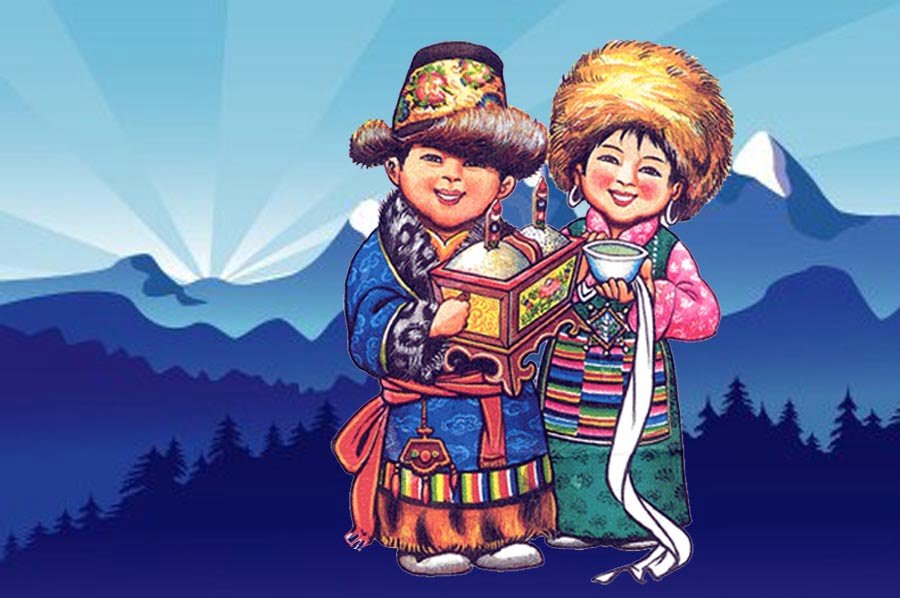Discover Tibet: Connect with Locals Using Simple Tibetan Greetings
Embarking on an adventure to Tibet’s remote and magical regions means more than just exploring breathtaking landscapes; it’s also about connecting with its rich culture. A little effort in using the local language can deeply enrich your journey. Here’s how you can greet and thank the friendly Tibetans you’ll meet along the way.

Say Hello with “Tashi Delek”
“Tashi Delek” is your go-to phrase for “Hello” in Tibetan. It means “auspicious greetings” or “good luck,” carrying warm wishes for anyone you meet. Imagine walking through Tibet’s vast landscapes and being greeted with “Tashi Delek” by locals. This greeting is your key to a friendly interaction, showing respect and goodwill.
Express Gratitude with “Thuk Je Chay”
Another essential phrase is “Thuk Je Chay,” meaning “thank you.” Use it to thank the kind locals offering help or sharing their homes. This simple expression of gratitude can make a big difference, leaving a lasting positive impression and forging stronger connections with those you encounter.
Dive Deeper into Tibetan Culture
Tibet is a land of diversity, home to various dialects and unique traditions. Before you visit, it’s a good idea to learn about the specific customs of the area you’re exploring. Understanding local greetings and manners shows your respect and interest in Tibetan culture, enhancing your experience.
Why Learning Tibetan Greetings Matters
Arming yourself with these greetings opens up a world of genuine interactions. You’re not just a visitor; you become a participant in Tibetan life, experiencing unparalleled hospitality and warmth.
So, as you set out on your Tibetan adventure, remember:
- Greet locals with “Tashi Delek” for a warm introduction.
- Say “Thuk Je Chay” to show appreciation.
- Explore the nuances of local dialects to deepen your cultural immersion.
By embracing Tibetan language and traditions, you unlock a more meaningful travel experience, filled with connections that turn into cherished memories.
Pronouns and Plurals in Tibetan
Personal Pronouns
Tibetan language distinguishes between singular and plural forms in its pronouns, covering first person (“I” and “we”), second person (“you” singular and plural), and third person pronouns with respect and formality levels.
The Plural Suffix: “Tso”
Adding “Tso” to nouns indicates their plural form, helping you navigate conversations about groups, like “us” or “friends.”
Farewells: More Than Just Goodbye
In Tibetan culture, farewells carry warmth and respect. Instead of a direct “Goodbye,” phrases like “please go slowly” or “please stay” are common, reflecting the polite and considerate nature of Tibetan social interactions.
Honorifics: Showing Respect
Using honorifics like “Lags” after someone’s name or title is a way to show respect or affection, a practice especially prevalent in Central Tibetan dialects. Whether you’re addressing a teacher, a parent, or just adding a touch of respect to a friend’s name, these linguistic nuances highlight the importance of respect in Tibetan culture.
Navigating Formality and Politeness
Tibetan language is rich in honorific and humble forms, used to express politeness across different social hierarchies. While dialects vary in the usage of these forms, being mindful of when and how to use them can prevent social faux pas and foster genuine connections.
Key Takeaways for Travelers
Embracing the Tibetan way of greeting and parting, understanding the use of personal pronouns, and showing respect through language are all essential for travelers seeking a deeper connection with Tibet and its people. By integrating these phrases and cultural insights into your journey, you’re set to experience the warmth, hospitality, and rich heritage of Tibet on a whole new level. So, as you prepare for your adventure, remember to greet with “Tashi Delek,” thank with “Thuk Je Chay,” and navigate social interactions with respect and openness.
Please install Microsoft Himalayas font for viewing Tibetan Translation.
- Hello: Tashi Delek བཀྲ་ཤིས་བདེ་ལེགས།
- How are you? : keh-rang ku-su de-bo yin-peh? ཁྱེད་རང་སྐུ་གཟུགས་བདེ་པོ་ཡིན་པས།
- Good-bye: kah-leh phe ག་ལེར་ཕེབས་ཨ།
- See you later: Jay ma jal yong རྗེས་མ་མཇལ་ཡོང་
- I’m Sorry : Gong ma tsom rok དགོངས་ན་མ་འཚོམ་རོགས།
- You’re Welcome : kay-nang-gi-ma-ray གལ་གནང་གི་་མ་རེད།
- What is your name?: Ming la Garey Ser kyi yoe? ཁྱེད་རང་མིང་ལ་ག་རེ་ཟེར་ཀྱི་ཡོད།
- My name is …. : Ngah…… yin. ངའི་མིང་ལ་ …… ཟེར།
Pronouns and relations
- I : ngah ང་
- You : keh-rahng ཁྱེད་རང་
- he/she: khong-rahng ཁོང་རང་
Directions and transportation
- left : Yon la གཡས་ལ་
- right : Yay la གཡོན་ལ་
- go straight ahead : kar duk paeb ཁར་ཐུག་ཕེབས།
- bus: Moda མོ་ཊ་
- bus station: moda-babtsuk མོ་ཊ་འབབ་ཚུགས།
Places
- hotel: Donkhang འགྲོན་ཁང་
- gas station: Noom Luk Sa སྣུམ་བླུགས་ས།
- bank : Ngul khang དངུལ་ཁང་
- monastery: Gompa དགོན་པ།
- hospital: Men-khang སྨན་ཁང་
Shopping
- price: Gong Zay གོང་ཚད་
- expensive : Gong- Chen Po གོང་ཆེན་པོ་
- cheap : Gong Kay Po གོང་ཁེ་པོ་
- money : Pay-xia པད་ཤག་
- What is this? : Dee Gare ray? འདི་ག་རེ་རེད།
- How much: Ga Tsoe Ray ག་ཚོད་རེད།
- I will take it: Nga la Go Yoe ང་ལ་དགོས་ཡོད་
- I will leave it : Nga la Mo Go ང་ལ་མི་དགོས།
Time and days
- daytime: Nyin Mai Gung ཉིན་མའི་དགུང་
- night : Tsen Nak Gong མཚན་ནག་དགོང་
- yesterday : kay sa ཁ་སང་
- today : Di-ring དེ་རིང་
- tomorrow : Sang Nyin སང་ཉིན།
- morning: Shok gai ཞོགས་ཀས།
- noon : Nying Gong ཉིན་དགུང་













